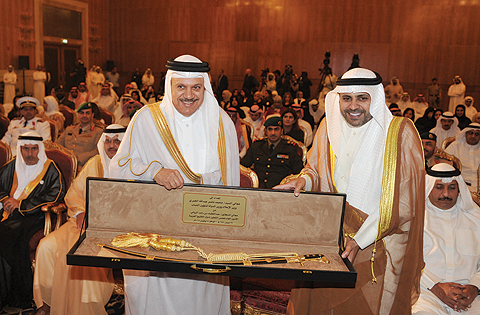GCC GDP reached $1.5 trillion in 2017, ranking 13th in the world
 KUWAIT: Minister of Information Mohammad Al-Jabri (right) presents a memento to GCC Secretary General Abdullatif Al-Zayani during the inauguration ceremony of the ‘GCC Days.’ —Photo by Joseph Shagra
KUWAIT: Minister of Information Mohammad Al-Jabri (right) presents a memento to GCC Secretary General Abdullatif Al-Zayani during the inauguration ceremony of the ‘GCC Days.’ —Photo by Joseph ShagraKUWAIT: Gulf Cooperation Council (GCC) states are currently on the way to implement the GCC railway project, which will interconnect the GCC states from Muscat to Kuwait throughout a 2,200-km network, GCC Secretary General Abdullatif Al-Zayani said.
He made his statement during the inauguration ceremony of the 'GCC Days', which is organized by the Ministry of Information in cooperation with the General Secretariat of the Gulf Cooperation Council from Nov 5 to 9. The ceremony, held at Al-Raya Ballroom, was attended by Minister of Information and Minister of State for Youth Affairs Mohammad Al-Jabri, several GCC assistant secretaries, senior officials of Kuwait's ministry of information, dignitaries and media from all GCC countries.
Economic level
Speaking about the economic level, Zayani mentioned the future vision is to achieve comprehensive economic unity. Following the adoption of the economic agreement in 1981 (which was revised in 2001), the GCC states achieved GCC citizenship and established the GCC Customs Union, GCC Monetary Union and the electricity interconnectivity project.
"The GCC states occupy a considerable place among world countries. The GCC GDP accounted for $1.5 trillion in 2017, thus ranking 13th in the world. The GCC also occupies a top position in the list of exporting countries, as GCC exports accounted for some $536 billion in 2017, while imports accounted for $450 billion in 2017. The volume of GCC trade with other countries of the world accounted for almost $985 billion in 2017 and the volume of intra-GCC trade accounted for $133 billion in 2017," concluded Zayani.
GCC achievements
Zayani reviewed various spheres of successful GCC achievements. "At the political level, the GCC is an important and effective regional and international organization that enables it to build firm relations and broad strategic partnerships with countries and international economic blocs. This aims to enhance the common interests of the GCC states, intensifying political, security and cultural coordination and developing economic and trade cooperation with these countries and international economic blocs," he noted.
According to him, at the military level, the areas of GCC joint defense action were enhanced towards more joint integration, cooperation and coordination. The GCC armed forces are ready to defend GCC states and protect their achievements and vital interests by implementing the joint defense agreement that was endorsed in 2000, and the creation of the Peninsula Shield Force. The agreement stipulates that an attack on any individual GCC state is to be deemed an attack against all GCC states," stressed Zayani.
Defense cooperation
He also spoke about joint defense cooperation. "Different military bodies were formed to intensify joint defense efforts, such as the GCC Unified Command and Control, Unified Maritime Operations Center, Maritime Duty Force (81) and the Unified Air Defense Operations Center. Furthermore, a program for increasing and enhancing defense integration through intensifying joint military exercises and drills between individual GCC states or with friendly countries and allies was implemented," he added.
Zayani then mentioned the security level. "GCC states are cooperating to enhance their security and stability and protect their societies by combating all kinds of crime, confronting extremist terrorist organizations, endorsing strategic and security agreements and setting up effective security agencies," he explained.
The anti-terrorism sphere is also part of the achievements. "The GCC states adopted the security strategy for countering terrorist extremism in 2002 and signed the anti-terrorism agreement in 2004. We also enhanced joint security cooperation through establishing the GCC Drug Control Criminal Information Center (Doha) and the GCC Emergency Management Center (Kuwait), in addition to organizing joint security exercises (Arab Gulf Security 1) hosted by Bahrain in 2016. The second edition of the exercise in planned the United Arab Emirates," stated Zayani.
More integration
This event aims to achieve more coherence, cooperation and integration between GCC states and their citizens. "The wise GCC leadership put much effort to support and fulfill the aspirations of the peoples of the GCC states towards security, advancement and prosperity," Jabri said during the ceremony. "These events are organized to shed light on the GCC's blessed journey towards achieving security and stability, avoiding the surrounding unrest and to introduce pioneering roles in various fields," he added.
Jabri highlighted the importance of establishing economic and trade relations, enhancing culture, encouraging local tourism and supporting the existing partnership among the GCC countries at all levels. "The original values were established by the founding fathers of a strong Gulf entity that demonstrates our unity of purpose and shared destiny and protects the security and stability of our privileged Gulf within a strategic partnership and sustainable development," he concluded.
Activities held during these five days include workshops, symposiums, training programs, musical performances and entertainment activities. Most morning activities will be held at Kuwait University, in addition to other locations. The activities will conclude on Friday, Nov 9, 2018 with a kite show and air show on Gulf Road.
By Nawara Fattahova










